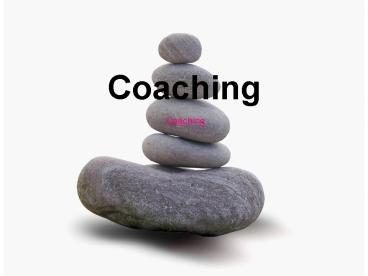Coaching - PowerPoint PPT Presentation
1 / 28
Title:
Coaching
Description:
Understand the what is coaching, with relation to: Styles of leadership. Learning styles ... personal goals with in a facilitative interpersonal relationship. ... – PowerPoint PPT presentation
Number of Views:81
Avg rating:3.0/5.0
Title: Coaching
1
Coaching
Coaching
2
Additional Reading
- Sports coaching concepts, a framework for
coaches behavior, John Lyle - Athletics development, Vern Gambetta
- Multiple intelligences, Howard Gardner
3
Objectives and Outcomes
- Understand the what is coaching, with relation
to - Styles of leadership
- Learning styles
- Multiple intelligences
- Philosophy
- Process
- Overall Role
4
Coaching
- To understand the importance of context and
relationships, not isolated facts.
5
Intelligence
- Learning styles
- Multiple types of inteligence
6
What Is Coaching?
- Is there a difference?
- Teacher
- Trainer
- Coach
7
To Coach
- Is to give tuition or instruct
- To prepare a student for an examination.
8
Coaching
- Direct and manage the process that leads to
achivement of identified goals. This includes the
aspirations and abilities, the goal is identified
the external environemnt and necessary
intervention program co-ordinated and
intergration are the key words.
9
Syles of Leadership
- Autocratic
- Democratic
- Humanistic aproach
10
Autocratic
- The primacy of the coach in decision making
- Dominating, directive aproach to IP-behavior
- Transmission of knowedge, teaching and learning
is assumed to be one way - Coach determined rules rewards, standards
- Rigidity and lack of personal empathy
11
Democratic
- A Parcipative decision making style
- Interactive communication process
- Human values incorporated into goals and
evaluation - Active involvement of athlete in
teaching-learning process - Flexibility, empathy and support in personal
relationships.
12
Performance-orientated, authoritarian,
autocratic, directing, dictatorial.Autocratic
DemocraticPerson-centred, humanistic, sharing,
democratic, caring, interactive
13
Humanistic aproach
- Person centred ideolagy
- Empowerment of the individual towards achieving
personal goals with in a facilitative
interpersonal relationship.
Sport is more than competition, it is part of
many other human experiances
14
Humanistic aproach
- Personal interpretation of human experiances
- Holistic view of human beings
- Centrality of freedom and autonomy
- Acceptance that experiances are individually
defined
15
Humanistic aproach Key Words
- Response to change
- Real freedom for athlets
- Clear Goals
- Gradual relinquishment of control
- Provide problem solving opportunities
- Individualisation of the coaching process
The eventual goal is individuals who have
developed their powers in a balanced and
intergraetd way.
16
Learning styles revisited
- Visual
- Auditory
- Kinesthetic
17
Visual
- Learn through seeing
- Via,
- Images, metaphors, analogies
- Diagrams, simalies
- Eg, turning a description into a flow chart
18
Auditory
- Learn through processing sound
- Via
- Hearing, audio tapes, explanations
- Conversations, talking to your self
- Eg. Convert info out loud, by group discusion.
19
Kinaesthetic
- Learn by doing
- Via
- Touch, feel(in your mind)
- Doing, practical experiances
- Eg, by role playing or practical experiements.
20
Multiple intelligecnces
- Linguistic
- Logical-mathmatical
- Visual-spatial
- Bodily-kinaesthetic
- Musical
- Interpersonal or social
- Inside or intuitve
21
Linguistic
- Can
- Speak
- Write
- Learns well from
- Reading
- Writing
- Listening
- researching
22
Logical-mathmatical
- Can
- Reason
- Calculate
- Keep logic going
- precision
- Learns
- Mental problem solving
23
Visual-spatial
- Can
- Draw
24
Multiple intelligecnces
- Linguistic
- Logical-mathmatical
- Visual-spatial
- Bodily-kinaesthetic
- Musical
- Interpersonal or social
- Inside or intuitve
25
Multiple intelligecnces
- Linguistic
- Logical-mathmatical
- Visual-spatial
- Bodily-kinaesthetic
- Musical
- Interpersonal or social
- Inside or intuitve
26
Multiple intelligecnces
- Linguistic
- Logical-mathmatical
- Visual-spatial
- Bodily-kinaesthetic
- Musical
- Interpersonal or social
- Inside or intuitve
27
Multiple intelligecnces
- Linguistic
- Logical-mathmatical
- Visual-spatial
- Bodily-kinaesthetic
- Musical
- Interpersonal or social
- Inside or intuitve
28
Multiple intelligecnces
- Linguistic
- Logical-mathmatical
- Visual-spatial
- Bodily-kinaesthetic
- Musical
- Interpersonal or social
- Inside or intuitve
29
The role of a coach
- To direct and manage the process that leads to
achievement of identified goals. - Intervention, coordination and intergration are
the key words
30
Complexity of interactions
Preparation Control of variables Interpersonal
relationship Recruitment
Coach
Athlete
Competition Coaching Stratagy/tactics Selection p
reperation
Environment
Player Variability Effort Capacity/ability preper
ation
Performance
31
Coaching Philosophies.
- Behaviour represents a set of values
- Styles of leadership
- Styles of learning
32
Potential linkages between values
Coach unaware of values
Coachs publicly stated values
Coachs Personal Values
Practice
Match no
Match yes
Match yes
Match no
Organisational Values
Consensual Socal values
Athletes Values
33
The coaching Process
- Should be treated as an integrated process
- Systematic Collection of isolated training
episodes - Accounts for the relationship between values and
practice.
34
Example of a chart
- Group tasks
- Recieve statments on coaching phylosophy
- Types of coaching
- Mulitliple intelagences and anotate 1 statement
Coaching the way to do it.
35
Example of a chart
36
Examples of default styles
- Text and lines are like this
- Hyperlinks like this
- Visited hyperlinks like this
Text box
Text box With shadow































